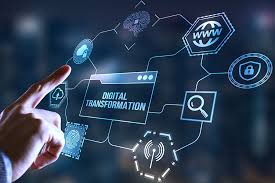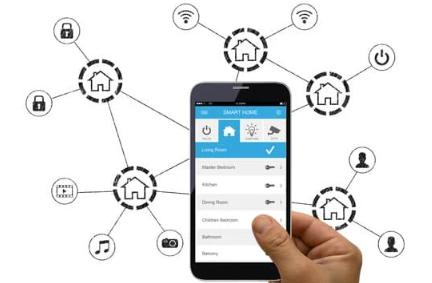
Blog
Digital Transformation: Guiding Your Business Evolution with CodriveIT

In today's hyper-connected and rapidly evolving world, Digital Transformation is no longer an option but a strategic imperative for businesses of all sizes. It's a holistic, fundamental shift in how organizations operate and deliver value to customers by integrating digital technology across all areas of the business. This journey goes beyond simply adopting new tools; it involves a reimagining of business models, processes, culture, and customer experiences. At CodriveIT, a leading software development company in Coimbatore, we are your trusted partner in navigating this complex landscape, building custom solutions that drive innovation, efficiency, and sustainable growth.
What is Digital Transformation?
Digital transformation is about leveraging digital technologies to fundamentally change how a business operates. It's not just about "going paperless" or having a website; it's about:
- Rethinking Business Models: Creating new revenue streams, optimizing value chains, and redefining how you interact with customers and partners.
- Transforming Processes: Automating workflows, streamlining operations, and improving decision-making through data-driven insights.
- Cultivating a Digital Culture: Fostering a mindset of agility, innovation, and continuous learning throughout the organization, empowering employees with the right tools and training.
- Enhancing Customer Experience: Delivering seamless, personalized, and engaging experiences across all touchpoints, building stronger relationships and loyalty.
Why Digital Transformation is Crucial for Businesses in Coimbatore (and Globally):
For businesses in Coimbatore and beyond, embracing digital transformation offers a multitude of benefits:
- Increased Agility & Responsiveness: Adapt quickly to changing market conditions, customer demands, and competitive pressures.
- Enhanced Customer Experience: Meet customer needs on their terms with personalized services, omnichannel access, and 24/7 support.
- Improved Operational Efficiency & Productivity: Automate repetitive tasks, streamline workflows, reduce manual errors, and optimize resource allocation, leading to significant cost savings.
- Data-Driven Decision Making: Collect and analyze real-time data to gain actionable insights into customer behavior, market trends, and operational performance, enabling smarter and faster decisions.
- New Revenue Streams & Business Models: Unlock opportunities for new products, services, and entirely new ways of generating income.
- Competitive Advantage: Stay ahead of competitors by innovating faster, delivering superior customer value, and operating more efficiently.
- Improved Collaboration & Communication: Break down internal silos, fostering better information flow and teamwork across departments.
- Future-Proofing Your Business: Build resilience and adaptability to thrive in an increasingly digital and unpredictable global economy.
- Better Sustainability: Optimize resource usage, reduce waste, and promote environmentally friendly practices through digital tools.
The Key Pillars of Digital Transformation:
A successful digital transformation journey rests on three interconnected pillars:
- People: Empowering your workforce with the right skills, tools, and a digital mindset. This includes training, fostering a culture of innovation, and promoting collaboration.
- Processes: Streamlining and automating existing business processes, or even reinventing them entirely, to achieve greater efficiency and agility.
- Technology: Adopting and integrating cutting-edge digital technologies to enable new capabilities and drive innovation.
CodriveIT's Comprehensive Digital Transformation Services:
At CodriveIT, we don't just provide technology; we partner with you on your entire digital transformation journey. Our comprehensive services include:
1. Strategic Consulting & Roadmap Development: * Digital Maturity Assessment: Evaluating your current state, identifying strengths, weaknesses, and opportunities for digitalization. * Vision & Goal Setting: Defining clear, measurable objectives for your transformation. * Custom Roadmap Creation: Developing a phased, strategic plan tailored to your business needs, budget, and industry. * Change Management Strategy: Planning for the cultural shifts and employee adoption crucial for success.
2. Custom Software Development: * Enterprise Resource Planning (ERP) Solutions: Customizing and integrating ERP systems to streamline core business processes like finance, HR, supply chain, and manufacturing. * Customer Relationship Management (CRM) Systems: Building tailored CRM solutions to enhance lead management, sales automation, and customer service. * Supply Chain Management (SCM) Software: Optimizing logistics, inventory, and supplier relationships with custom SCM solutions. * Manufacturing Execution Systems (MES): Connecting the factory floor to the enterprise level for real-time production monitoring, quality control, and efficiency gains. * E-commerce & Digital Commerce Platforms: Developing robust online stores, marketplaces, and digital marketing integrations to expand your reach. * Mobile App Development: Creating intuitive and powerful mobile applications for customer engagement, internal operations, and field services.
3. Cloud Computing & Infrastructure: * Cloud Migration Strategy: Helping you move your existing infrastructure and applications to scalable and secure cloud platforms (AWS, Azure, Google Cloud). * Cloud-Native Development: Building new applications specifically designed to leverage the benefits of cloud environments. * Hybrid Cloud Solutions: Designing flexible architectures that combine on-premise and cloud resources.
4. Data Analytics & Business Intelligence: * Data Integration & Warehousing: Consolidating data from disparate sources into a unified system for comprehensive analysis. * Advanced Analytics & Reporting Dashboards: Providing real-time insights into KPIs, market trends, and operational performance to support data-driven decision-making. * Predictive Analytics: Using historical data and machine learning to forecast future trends, optimize resource allocation, and identify potential risks.
5. Emerging Technologies Integration: * Artificial Intelligence (AI) & Machine Learning (ML): Implementing AI for automation (RPA), personalized recommendations, fraud detection, predictive maintenance, and intelligent chatbots. * Internet of Things (IoT): Connecting physical devices and sensors to gather real-time data for enhanced monitoring, control, and automation in industries like manufacturing, logistics, and smart buildings. * Blockchain Technology: Exploring and developing secure, transparent, and decentralized solutions for supply chain traceability, secure transactions, and digital identity. * Hyperautomation: Combining RPA, AI, ML, and other technologies to automate increasingly complex business processes end-to-end.
6. Cybersecurity & Data Governance: * Implementing robust security measures, data encryption, access controls, and compliance frameworks to protect sensitive data and ensure regulatory adherence.
7. UI/UX Design for Digital Experiences: * Crafting intuitive, engaging, and user-friendly interfaces that drive adoption and deliver seamless digital experiences for your employees and customers.
The Digital Transformation Journey (Typical Steps):
While every journey is unique, a successful digital transformation typically involves these phases:
- Define Your Vision & Strategy: Clearly articulate your "why," "what," and "how." What are your pain points? What do you want to achieve?
- Secure Executive Buy-In & Foster a Digital Culture: Top-down commitment is crucial. Communicate the benefits to employees and provide training to address skill gaps and resistance to change.
- Assess Current State & Identify Gaps: Understand your existing processes, technologies, and data infrastructure.
- Pilot & Experiment: Start with smaller, impactful projects to demonstrate value and learn quickly.
- Scale & Integrate: Expand successful pilot projects across the organization, ensuring seamless integration between new and existing systems.
- Optimize & Innovate Continuously: Digital transformation is an ongoing journey. Regularly analyze progress, gather feedback, and embrace continuous improvement and innovation.





